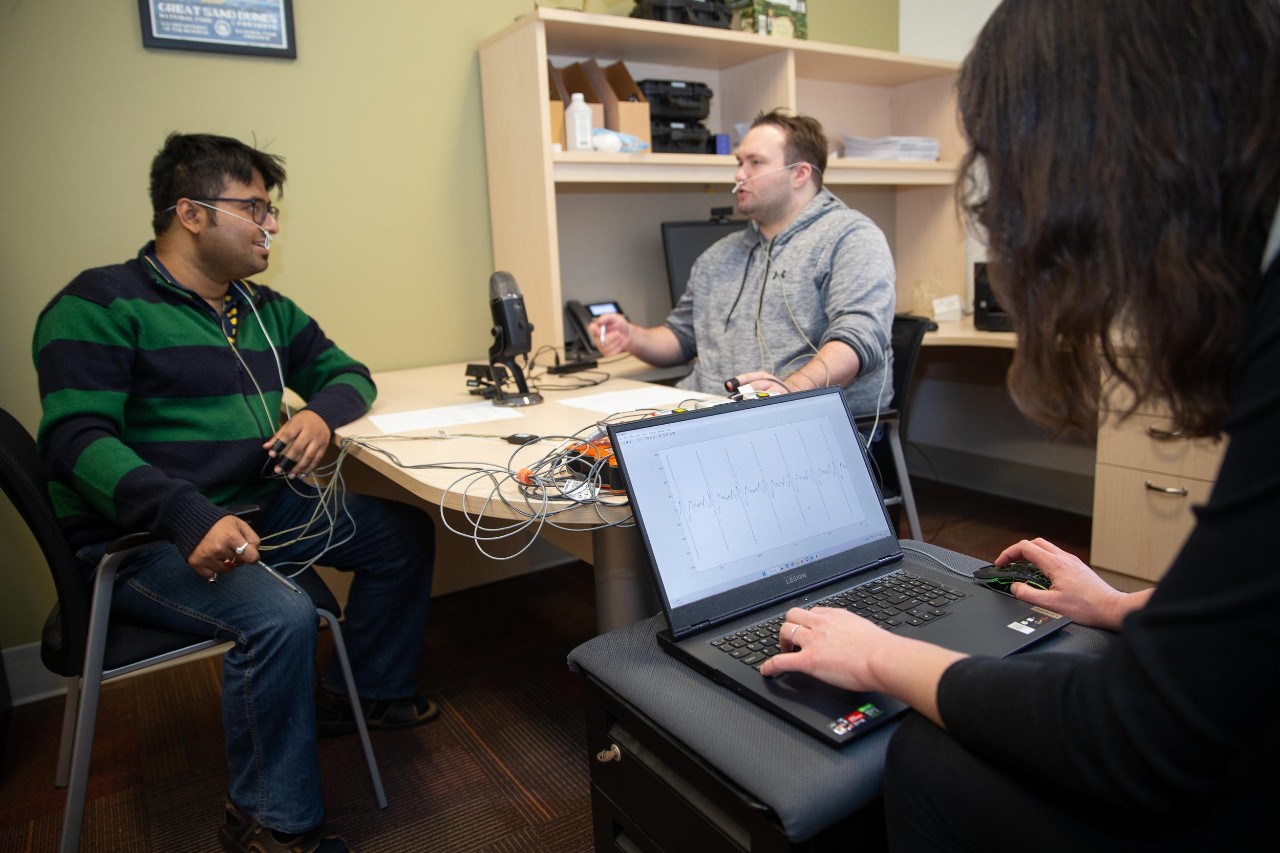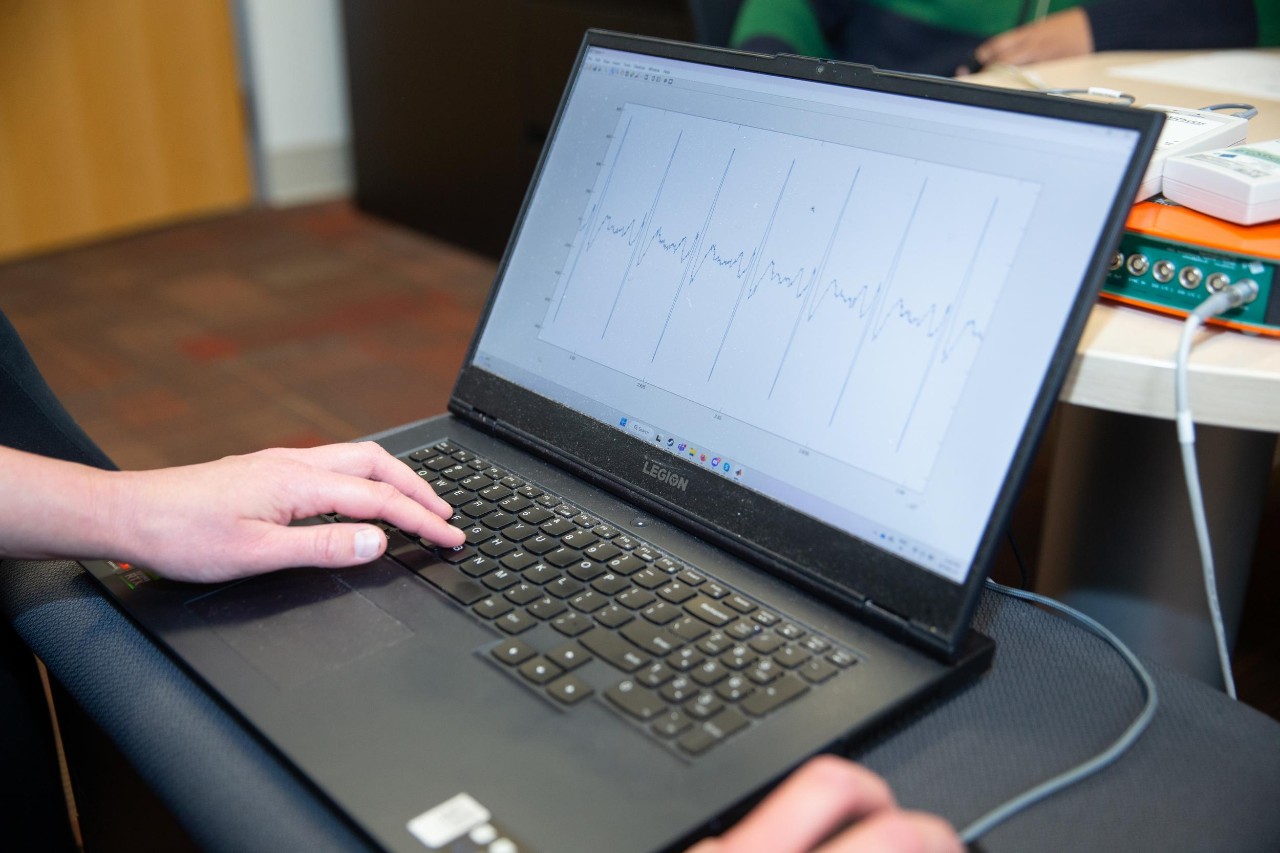
WFXB FOX: Computer can tell if you're a match
UC trained a computer to identify types of conversations based on the participants' physiology
WFXB Fox-TV highlighted research by engineers at the University of Cincinnati who taught a computer to recognize types of conversations based on the participants' physiology alone.
Researchers studied a phenomenon in which people’s heart rates, respiration and other autonomic nervous system responses become synchronized when they talk or collaborate. Known as physiological synchrony, this effect is stronger when two people engage deeply in a conversation or cooperate closely on a task.
In experiments with human participants, the computer was able to differentiate four conversation scenarios with as much as 75% accuracy. The study is one of the first of its kind to train artificial intelligence how to recognize aspects of a conversation based on the participants’ physiology alone.
The study was published in the journal IEEE Transactions on Affective Computing.
Lead author and UC doctoral student Iman Chatterjee said a computer could give you honest feedback about your date — or yourself.
“The computer could tell if you’re a bore,” Chatterjee said. “A modified version of our system could measure the level of interest a person is taking in the conversation, how compatible the two of you are and how engaged the other person is in the conversation.”
UC Associate Professor Vesna Novak said this field of affective computing could provide feedback to educators, therapists or other people who want to understand what's really going on in interpersonal dynamics.
Featured image at top: UC engineering students connected to sensors have a conversation while UC Associate Professor Vesna Novak monitors their physiological responses on a computer. Photo/Andrew Higely/UC Marketing + Brand
More UC engineering in the news

A computer screen shows the physiological responses of a person engaged in conversation. Photo/Andrew Higley/UC Marketing + Brand
- Jerusalem Post: New app can tell if you're a match
- Science Daily: Smash or Pass? This computer can tell
- India AI: Is your date a 'smash' or 'pass?'
- Gadzetomania (Poland): This computer can tell if you're a match
Related Stories
Phys.Org: How can computer chips predict the future of gene synthesis?
March 4, 2022
News outlets highlight a study by the University of Cincinnati that used the evolution of the microchip to predict advances in synthetic biology.
Dayton Inno: UC alumni develop wearable safety device for runners
October 28, 2021
University of Cincinnati biomedical engineering graduate Jack Randall is developing a wearable safety device for runners and cyclists. Zoza, a small, wearable SOS device, can be attached to a shoe or zipper and is intended for endurance athletes who often don’t carry a phone or who travel through remote areas. A user can press a button to send an emergency alert and the device even works in locations where cell service is unavailable.
WVXU: CVG is using AI to predict passenger movement
March 9, 2022
WVXU public radio highlighted a University of Cincinnati research project designed to shorten lines at airports like Cincinnati/Northern Kentucky International.
Spectrum News: High school students learn STEM in UC program
July 6, 2022
Spectrum News highlights UC's Biology Meets Engineering program which gives high school students an introduction to STEM fields in a project sponsored by the National Science Foundation.
WVXU: UC researchers invents lab-on-a-chip device for cancer
February 10, 2021
WVXU talks to UC College of Engineering and Applied Science professor Leyla Esfandiari about her point-of-care device that enables noninvasive point-of-care testing for cancer using biofluids.
Cincinnati Edition: What will Intel's plant mean for Ohio?
February 11, 2022
Cincinnati Edition talks to University of Cincinnati computer engineering professors Ranga Vemuri and Rashi Jha and associate professor of economics Michael Jones about what Intel's proposed fabrication plants will mean for Ohio's economy and technology industry.
RePlay Magazine: Professor uses pinball as teaching tool
November 10, 2021
Zach Fuchs incorporated his hobby of fixing up old pinball machines into his engineering courses and lab at the University of Cincinnati. Fuchs, assistant professor in the Department of Electrical Engineering and Computer Science, teaches two courses centered around pinball.
AP: UC alum Arnold Spielberg dies
August 27, 2020
Arnold Spielberg, 103, helped General Electric design some of the first and most powerful mainframe computers of the 1950s. His work helped set the stage for BASIC computer programming.
Daily Mail: Hope for in-home coronavirus test
September 4, 2020
International media examine UC's research on at-home diagnostic tests for viruses like influenza and coronavirus.
